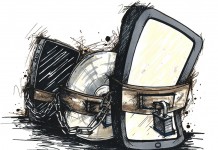
Last year, I wrote a post for Teleread on the true cost of ebooks, using my own collection as an example. The recent dialogue between Rich Adin and I on the relative costs of print books (in which real estate for paper book storage is a factor) vs ebooks (in which device costs and higher list prices due to no secondary markets are a factor) had me re-examining this issue. So, how did my ebook costs net out?
PART 1: HOW MUCH DOES A PRINT BOOK COST?
I’ll start by setting some baselines for the typical cost, to me here in Canada, of a paper book. We’ll start with new books purchased at a major chain. A new release hardcover is about $30 including tax. I never, ever buy those. I never have, even in the pre-ebook days. Those are books I would either get from the library or wait for the paperback. But just for baseline’s sake, let’s assume I would buy it. And let’s assume we’re taking about a best-seller that will be marked down somewhat. We’ll also assume I have a membership card at the store I shop at (I do) and can get the member discount. So, my best price on, say, the current Charlaine Harris? $16.25 at Indigo.ca as of this morning. As for new paperbacks, these are seldom marked down the way hardcover best-sellers are, and have pretty standard prices—$15 for a trade paperback, $10 for a mass-market one.
How about used books? Negligible cost if it’s an older paperback, but increasingly, my local used bookstore does not acquire those. What they do acquire is new-release hardcovers which they buy from readers who are done with them, and trade paperback literary fiction which they buy in bulk from sources unknown. They do have a fairly good stash of current titles. They sell these books for half off the cover price—so, $11-15 for a typical purchase. We’ll split the difference and say $12.50 for that.
As for the dollar table, I don’t shop there. If it’s a long-running series, I typically have all the backlist titles already if it’s a series that interests me. If it’s an author new to me, I prefer to stick to the ebook market since I don’t have to get rid of them due to space issues. If I do want to discover a new author through a cheap dollar table read, there is a digital dollar table now—I’ll go to Smashwords and troll for something there. But fine, we’ll say $2 as the average of the $1-4 bargain bin.
So, averaging those five numbers gives me $11.15 for my average print book cost. If I can add up all the money I have spent on ebooks and ebook devices, and come out at under $11.15 per book, I’ll be ahead.
So, can I do it?
Two notes on my process here.
1) When I say ‘device’ I mean ‘device specifically acquired for the purpose of reading.’ I am not counting multifunction devices since I don’t generally read on them. I do read magazines on the iPad, but I did not buy the iPad specifically to read on, and I don’t usually choose to read on it for fun if I have other options. So, device here means ‘dedicated ebook reader.’
2) When I say ‘books read’ I mean ‘books I acquired to read and actually did read.’ If it was a freebie but I read it, it counts. If it was a freebie I have not gotten to yet, it does not count. And similarly, a purchased but as-yet-unread book does not count either. It has to be a book I’ve read and finished; That seems like the fairest way to get an accurate cost-per-book calculation. Of course, if I do read more of these books before I spend further money, that will bring my cost per book down significantly.
PART 2: HOW MUCH DOES AN EBOOK COST?
So, onto the fun stuff—and no need for averages here, I have exact numbers, since I have been tracking my ebook spending ever since I got my first reader. So, let’s take device costs first. There was an expenditure for the first ebook reader, and then lesser expenditures since as my old readers got sold to subsidize the new ones. My last ebook reader was sold for pretty much what the new one cost, since the Kindle has come down in price so much. So, lifetime device spending? I have this in my spreadsheet at about $465.
Now, books. The free ones subsidize the purchased ones (and the costs of the devices themselves). I do read classics, and I also get a lot of review copies so some of the contemporary books I read don’t cost me out of pocket. New best-sellers, I can get from the library (my local library loans ebooks and I subscribe to two others) or purchase from Kobo or Amazon if they get discounted under $11. I buy a lot of stuff with coupon codes, so that brings down my total cost, but since the advent of the agency model my spending has gone down a lot. With all of that said, my total lifetime money spent on ebooks is $3019.32. And that represents 346 books read.
So, add up money spent—on both devices and books—and divide by number of books read, and what does that give me? It gives me a cost per book of $8.73. So, are ebooks a money-saving option for me, even factoring in the cost of the gadget? Yes, absolutely!


































I don’t know what my true ebook costs because (a) I don’t track my spending and (b) at least 80% of all the ebooks I have, and probably more, cost me $0 between discount coupons, specials, and the like. I see little reason to spend money on fiction, with rare exceptions, such as authors Vicki Tyley, Shayne Parkinson, Richard S. Tuttle, and Emma Jameson, because for me, most fiction is read-once-throw-away books. Consequently, my experience, with ebooks tracks Joanna’s experience as regards ebooks being less costly than hardcovers even though each of the 2 readers I have cost $300 (my original Sony 505 and my newer Sony 950).
Overall, I think Joanna is correct if most of your reading centers around nonbestsellers, as mine does and I believe hers does. I wonder, however, if the benefits would stack up if most of our reading was from the pbook bestseller list (as opposed to the ebook bestseller lists) and/or nonfiction. I know that in my case, if instead of buying my nonfiction in hardcover form I bought the same titles in ebook form, my costs would be higher than they are; many, if not most or nearly all of my nonfiction comes from the Agency 6.
I suspect it all boils down to specifically what books we read as to whether or not ebooks are more economical than pbooks or even whether a book is available in ebook form.
Rich, I agree, a lot does depend on habits. That’s why blanket statements such as ‘ebooks are more expensive’ or ‘i buy only used books’ are so problematic. Buying used books is find if the books you want to read are available via that channel, but this is not always so. And people have all different situations. My dad only reads classics, so the cost to him is zero. My stepdad has no literary preferences at all and will read whichever book happens to be lying on the table when he decides he feels like reading. Personally, I do re-read, so I like having my own if the book is part of a series or if it’s an author I know I enjoy. So ‘just get it from the library’ is not my preference, and since I do collect a whole series if I like it, space for paper books is an issue. That is why I limit my paper purchasing to cookbooks, textbooks and psoetry, genres where how the book looks really matters to me.
Interesting. I’ve started to record all of my ebooks purchases, but I haven’t yet gotten anything before last Nov recorded yet. So far though, my average book cost is around $.60 per book.
I haven’t calculated cost per book read though, I’ll need to look at that.
Unfortunately, I never kept track of my physical book purchases so I don’t have that info. I probably bought 1 or 2 hardbacks a month at a cost of $20 – $25 and many paperbacks at grocery and discount stores at an average cost of $5 each.
Although I don’t have actual numbers, I’m sure I’m spending less between all of the free and indie books. I don’t buy the bestsellers any longer, I can’t justify the price for a book I can’t share or give away.
We do visit our library’s semi-annual sale and get lots of books there, usually at the $5 per bag price on the last day. We spend around $100 as a family.
At one time, 2008 through 2009, I kept a spreadsheet of ebooks purchase price against MSPR and the Amazon discounted price. I read a mix of genre, literary, and non-fiction titles. (There were more free commercial titles back then, but I only figured them in my calculations if I actually read them; Classics like the “Heart of Darkness” I had to buy because of Project Gutenberg’s plan vanilla text had been used for every free version. I rarely purchase or read the cheap indie titles.) Still, like Joanna, I came out head in savings back then and covered the cost of the device (Originally $399).
But I’m not so sure that would be the case today. Most genre fiction is the same cost as the mass market paperback; literary fiction or non-fiction can be more expensive or have only meager savings than the discounted Amazon paperback price. Many of the free commercial titles nowadays aren’t anything I’d ever read (Romance, Christian Fiction, etc).
Overall, I’d say ebooks will not be economical in the current market unless the reader is an indie aficionado, can tolerate Project Gutenberg editions, or likes what free books are available. Some readers might be able to squeeze enough savings to cover the cost of the device depending on personal choices, but I think it would be misleading to say ebooks are the less expensive option.
I can see how you would express the justification based on your experiences. Those who came before obviously didn’t need to justify the cost or they would not have spent $400 for an ereader. Those who are in the market today and want to know if it would be justified should realize that a Kindle costs $139 which is far less than half of the price that Greg says he spent of $399. I have found over 111 different web sites that have thousands of free ebooks. Many of those are pretty decent books. (If you are interested in the sites I speak of you may check out my Free Ebooks Pearltree here: http://bit.ly/mKEMY2 ). The likelihood of finding at least 13 ebooks out of the thousands of free books should be pretty good. But Greg is correct, only the consumer can make that kind of judgment. The best thing to do is to look at what is available, how easy it is to get it on the device of your choice, and compare that with what you would spend on books that year. If it is under the amount you would have spent on physical books then go for it. If you read more because you have access to more free ebooks then that also may justify it for you. Of course if you were not an avid reader then you probably wouldn’t be reading this anyways.